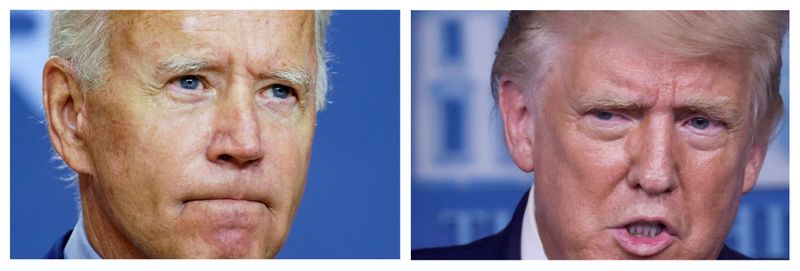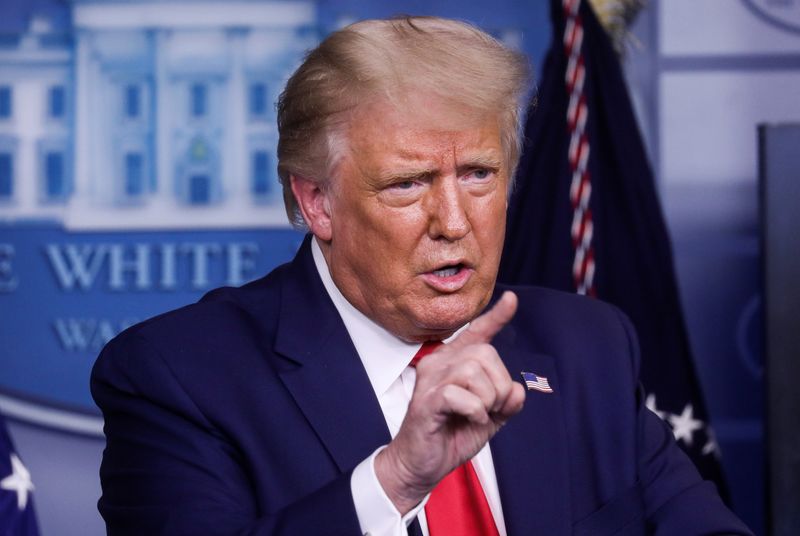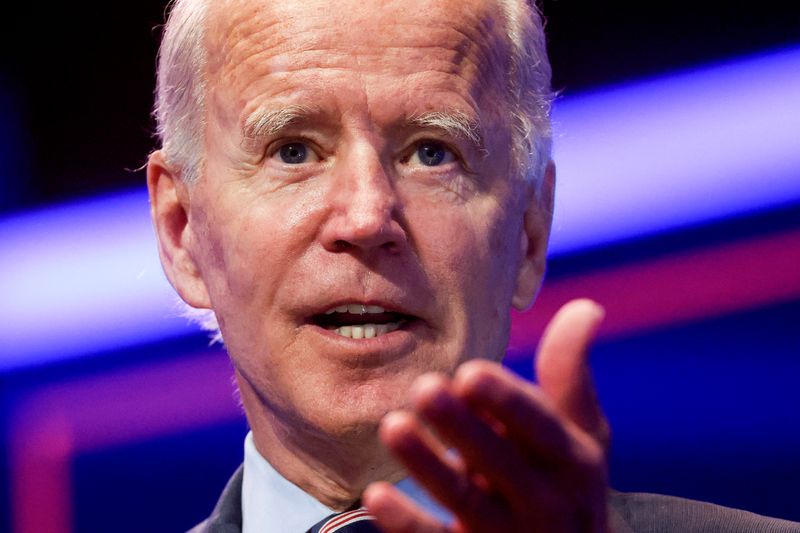(Reuters) – Republican President Donald Trump and his Democratic opponent, Joe Biden, have contrasting records on race and criminal justice, issues that have risen in prominence in the 2020 election.
Here is a look at their stances:
RHETORIC
In September, Trump and Biden each visited Kenosha, Wisconsin, where Jacob Blake, a Black man, was shot in the back several times by a white police officer the month prior.
The two trips were very different. Biden spoke by phone with Blake, who is hospitalized, and met privately with his family. Trump’s visit the same week was intended to convey support for police and he did not meet the Blake family.
Biden has said he was motivated to run for president after Trump blamed “both sides” following violence between white supremacists and counterprotesters at a 2017 rally in Charlottesville, Virginia, saying the comment was evidence of racism. Trump’s campaign accused Biden of mischaracterizing those remarks and said the president has condemned white supremacy.
POLICING
Trump responded to protests over the May 25 death of George Floyd in Minneapolis police custody by urging a militaristic response, including the use of troops, military-style equipment and federal law enforcement officials. He threatened to strip federal funding from Democratic-run cities like Portland unless they quell unrest.
In June, Trump signed an executive order on police reform, that encouraged police to use the latest standards for use of force, banned chokeholds unless an officer’s life was in danger, and he called for legislation to do more.
Democrats faulted the order for allowing some exceptions to the chokehold ban and placing no restrictions on warrants that let police enter a person’s property without knocking. Biden endorsed most of the bill that Democrats put forward, which had more categorical bans on both practices.
Biden has accused the Trump administration of lax oversight of police departments accused of civil rights violations. He also has said he supports reforming qualified immunity, a legal doctrine Trump wants to keep that shields officers from victims’ lawsuits.
The former vice president resisted calls to “defund the police,” instead promising $300 million in grants to improve officer diversity and training.
CRIMINAL JUSTICE
Trump in 2018 signed into law the First Step Act, a bipartisan measure reducing mandatory-minimum sentences, expanding drug-treatment programs for inmates and allowing some prisoners to finish their sentences early.
Trump also has supported “tough-on-crime” policies that disproportionately affect minorities, including seeking to restart executions of federal death row inmates.
Biden wants to eliminate the death penalty, solitary confinement and cash bail. He has pledged to grant $20 billion to state programs combating illiteracy and child abuse if they scale back mandatory-minimum sentences.
THE ECONOMY
When asked about his policies to close the inequality gap, Trump often responds by touting Black unemployment, which hit the lowest levels on record before the coronavirus pandemic. He has offered few targeted policy proposals to recover the jobs lost since then.
Biden called for laws making it easier to sue over wage discrimination. He would create new fair-lending and fair-housing protections, provide $300 million to cities that reduce discriminatory zoning regulations and create a task force to address the disproportionate deaths of Black people from COVID-19. He also would study the possibility of paying cash reparations to Black people to address the longstanding social disparities that resulted from slavery and segregation.
Both candidates voiced support for historically Black colleges and universities. Among other policies, Trump signed a law that the White House said made $255 million in funding for HBCUs permanent.
Biden’s plan making public colleges and universities tuition-free to most students would apply to many HBCUs. He would also invest more than $70 billion in the schools to start research institutes and for tuition support.
(Reporting by Trevor Hunnicutt in New York; Additional reporting by Jeff Mason in Washington; Editing by Aurora Ellis)
























